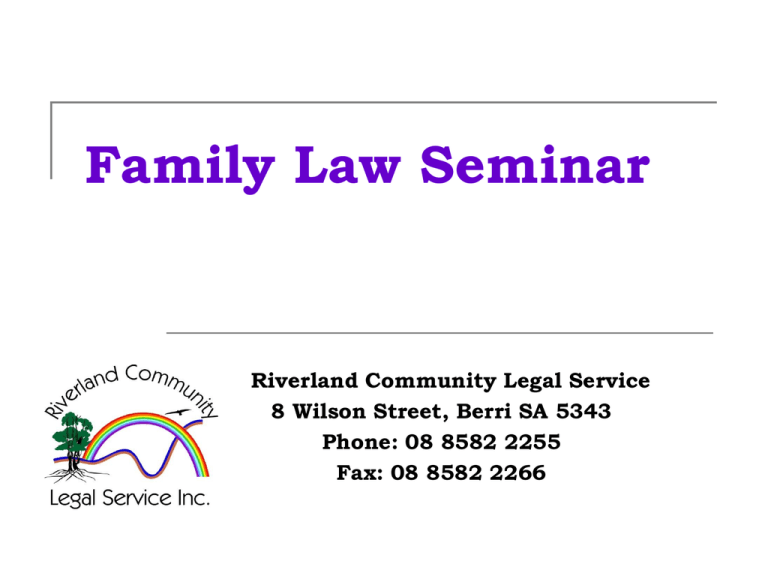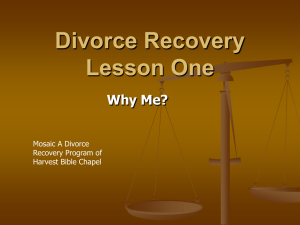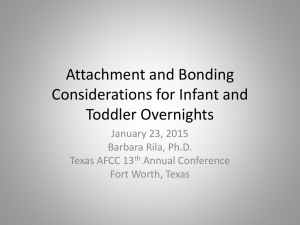
Family Law Seminar
Riverland Community Legal Service
8 Wilson Street, Berri SA 5343
Phone: 08 8582 2255
Fax: 08 8582 2266
Divorce
Ground for divorce:
Irretrievable breakdown of marriage
No likelihood of reconciliation
Living in Australia 12 months prior to seeking divorce
Separation must be clearly expressed and articulated
Fault is not an issue with divorce in Australia
Requirements – for application in Federal Magistrates Court:
Marriage Certificate –Certified copy not the original
Application – original and two copies
Self addressed stamped envelope
Payment for lodging - $550 approx or a reduction of payment
form – will need a concession card to aid exemption
Divorce
Marriage certificates not in English additional requirements
Translated by an authorised translator
There is a fee involved in this
Riverland Community Legal Service can find a translator
but we are not liable to any costs involved
The authorised translator need to sign a supporting
affidavit stating who they are, and that they are an
authorised translator
Need a certified copy of the marriage certificate
The affidavit needs to state what foreign language it is
translated from
Divorce – Separation Under One Roof
This can occur under the Family Law Act 1975 section
Need to present reasons to the Court why this is occurring
Financial reasons are generally main reason as to why this is
occurring
Needs to be confirmed by an independent witness affidavit
who can state the parties have:
Separate domestic lives
No sexual relationship
Separate rooms
Not socialising together
Individual chores around the house
Divorce – Resuming Cohabitation
If the parties to a divorce resume cohabitation on one
occasion but within a period of 3 months they separate again
and have thereafter lived separately and apart, these time
periods may be calculated together for the purposes of 12
months separation.
Divorce – Short Marriages
Parties to a short marriages of under two years under the
Family Law Act must attend counseling to attempt or look at
reconciliation with the assistance of a specified person or
organisation before they can file for divorce
This requirement for counseling can be waived under special
circumstances
For an application to waiver, decided by the Court from
evidence in a supporting affidavit
Divorce – Service
Service is the process of sending or giving court documents to
a party after they have been filed, in accordance with the
Rules of Court
Service ensures that all parties have received the documents
filed with the Court and are aware of the Court date and time
Court requires proof of service through their own forms
Divorce – Time Limits for Serving
If your spouse is in Australia, the documents must be served
at least 28 days before the Court hearing
If not the matter will be adjourned
If your spouse is overseas, the documents must be served at
least 42 days before the Court hearing
Divorce – Your responsibilities to
serve the application on ex
If you have made a sole application you must arrange to serve
the following documents on your spouse:
A sealed copy of the Application for divorce
A copy of the Marriage, Families and Separation brochure
Any other documents filed with the Court, except original of your
marriage certificate
Acknowledgement of service – must be signed and dated by ex
Self addressed stamped envelope
Covering letter stating please sign, date, put in envelope and send
back the Acknowledgement of Service
Divorce – How to serve?
Service by Post
You should only attempt this if you are certain that your spouse
will return the signed and dated Acknowledgement of Service
(Divorce) to you
Without this the Court cannot be sure your spouse has received
the documents and will adjourn the matter
Service by Hand
YOU CANNOT SERVE THE DOCUMENTS ON YOUR SPOUSE
YOURSELF
You must arrange for a person over 18 years of age to serve the
documents on your spouse
Divorce – How to serve?
The server can be:
A family member
A friend
A professional process server such as the Sheriffs Officer of Court
(a fee is involved with the Sheriffs Officer)
If a family member or a friend serves the documents they
must complete a supporting affidavit detailing all that they
did, that they identified who the person is or how they know
that person they are serving the documents on, how they
identified them, etc
There are specific forms for this
Divorce – How to serve?
Serving your spouse’s lawyer
If your spouse has a lawyer and they are willing to accept service,
you can serve the documents on your spouse’s lawyer
A signed Acknowledgment of Service from your spouse’s lawyer is
proof of service
This Acknowledgement must be filed with the Court
Divorce – Filing after service
After the documents have been served on your spouse you
need to make a copy of the service forms and file the original
at the Family Law Registry
If you attend the Court hearing , take the copy of your service
forms with you
Divorce – What if you cannot serve
your spouse?
If you are having trouble serving the divorce application on
your spouse because you do not know their whereabouts you
need to take reasonable steps to find their address
The steps you need to take involve:
Reasonable efforts to locate spouse
Contact family and friends
Contact last known place of employment
Contact last know place of accommodation
Search electoral role
File a supporting affidavit to dispense with normal service this
needs to show the Court what steps you have taken to ensure
service
Application in a case
Maybe ordered to place an advert in paper
Divorce – What if you cannot serve
your spouse?
Court may agree to dispense with normal service, though can
order you to serve the documents on the parent’s of your
spouse
MUST TAKE REASONABLE EFFORTS
Divorce - Hearing
Attendance in court generally only be required if you have
children under the age of 18.
Federal Magistrates Court only
Request permission to appear by phone or electronic
communication if over 250 kms away
Need to fax a written application to the Federal Magistrates
Court
A form from the Federal Magistrates Court needs to be used
Divorce – Decree Nisi and Decree
Absolute
If your application for divorce is approved in Court you will be
granted a ‘decree nisi’ on that day
Following this one month later you will receive a ‘decree
absolute’ and you will be free to remarry
CHANGE YOUR WILL
Terminology
The terminology in regards to Parenting Orders has changed,
it is no longer:
Custody
Residency
Now it is referred to as:
Child lives with
Child spends time with
Orders made in favour of
Parenting Orders - Obligations On
Lawyers
Amendments to the Family Law Act in 2006 introduced
greater obligations on lawyers with regards to Parenting
Orders
Must give the client information relating to non-Court based
family services and Court Processes.
The legal and possible social effects of the proposed proceedings
on children
The services provided by family counselors and family dispute
resolution
The steps in proceedings
The role of family consultants
Counseling facilities in relation to separation
Relationships Australia
Costs
Parenting Orders - Obligations On
Lawyers
The following brochures must be given to clients:
Marriage, Families and Separation
Pre-action Procedures for Parenting Orders
Family Consultants
Costs notice x 2
Relationships Australia for Compulsory Family Dispute
Resolution
Relationships Australia is the place to go in regards to
Compulsory Family Dispute Resolution, mediation & parenting
plans.
Parenting Orders
Parenting Orders come under the Family Law Act 1975
How Court determines the substance of Parenting Orders:
What is in the best interests of the child by examining:
The benefit of the children having a meaningful relationship with
both parents
The need to protect the children from physical or psychological
harm from being subjected to, exposed to, abuse, neglect or
family violence
Any views expressed by the children and any factors that the
Court thinks are relevant
The likely effect and change in circumstances will have on the
children
Parenting Orders
The willingness and ability of the parents to facilitate and
encourage a close and continuing relationship between the
children and the other parent
The practical difficulty and expense of the children
spending time with and communicating with a parent
To provide for the needs of child including emotional and
intellectual needs
The children are of paramount consideration
The maturity, sex, lifestyle and background of the children
and of either of the children’s parents
Parenting Orders
This includes Aboriginal and Torres Strait Islander backgrounds
Whether either party has failed to take the opportunity to
participate in making decisions about major long-term issues in
relation to the children, spending time with the children and
communication
Under the Family Law Act there is a presumption of:
Equal and shared parental responsibility for the child or
children’s long-term welfare, care and development
That both parents spend significant and substantial time with
the children – unless not practicable.
That both parents have involvement in the children’s day to day
routine unless not practicable.
If equal and shared responsibility for the child is found the
Court will then assess if it is in the best interest of the children
that they spend equal and shared time with their parents
Parenting Orders
Examples of what Parenting Orders can be comprised of:
Equal and shared responsibility for the child or children’s longterm welfare, care and development
The children live with the mother or father
The children spend time with the mother or father
Alternative weeks living with the mother or father (50/50)
The children spend time with the mother or father on a particular
week night
Children spend time with mother or father on alternate
Thurs/Fri/Sat/Sun
Parenting Orders
Regular weekly phone communication
Alternative or shared Easter
Alternative or shared Christmas
Shared school holidays
That the children spend time with the father on Father’s Day,
and same with the mother
That the children spend time with both parents on their
birthdays, and the parents birthdays as well
Any special/religious days at any other time as agreed
Parenting Orders
That both parents notify the other of any emergency involving the
children
That both parents be able to access and speak to the Doctors
about children’s health
Neither parent denigrate the other parent in front of the children
Neither parent can consume illegal substances while having
responsibility for the children
Pick up and drop off place for the facilitation of parents spending
time with children
Injunctions restraining parents from leaving the state or area
Compulsory Family Dispute Resolution
The Family Law Act 1975 as amended in 2006 requires
parents to obtain a certificate from a registered Family
Dispute Resolution practitioner before you file an application
for an order in relation to a child.
Relationships Australia provide mediation
Compulsory Family Dispute Resolution
Exclusions to Compulsory Family Dispute Resolution include:
Those lacking the capacity to contribute to Compulsory Family
Dispute Resolution
Urgent applications e.g. when a child or children are at risk and
their health and wellbeing is going to be or is undermined, parent
threatening to take the child interstate or overseas
Applications to the Family Court for Consent Orders
If it is not practicable, for example there is not facilities available to
one of the parties
Known family violence
Placing any party in mediation which would put one them at risk
Compulsory Family Dispute Resolution
Certificates that can be awarded are:
To the effect that the person did not attend Family Dispute
Resolution with the other party, and this was due to:
Refusal
The counselor deems it not appropriate to attend Family Dispute
Resolution
Person attended Family Dispute Resolution but did not make a
genuine effort to resolve the issue or issues
Parents can get a certificate stating mediation can’t take
place or in the application have a supporting affidavit of
evidence as to how you meet the exceptions criteria
Compulsory Family Dispute Resolution
If there is known family violence a further form also needs to
be submitted to the Court stating that they have attended
Relationships Australia and know of the services available to
them
If you make a knowingly false accusation of family violence
costs may be awarded against you
Urgent Applications
When matters are urgent area:
Child at risk
Parent is threatening to take the child out of the state or country
Apply for legal aid straight away to have proceedings initiated as
quickly as possible, and in the case of urgent applications legal aid
can be approved within 24 hours and then the application can me
made
Forms and processes
Child Recovery Orders
Child Recovery Order is a made by the Court requiring the
return of a child
Parent refuses to return child
Child at risk
Child Location Orders
Child Location Orders can be gained through the Family
Court to ascertain the whereabouts of the mother/father and
the children
An example would be a Commonwealth Information Order
seeking Orders for Centrelink to provide contact details to the
parent’s lawyer
Complex application must seek legal advice
Child Relocation Orders
Changes to the Family Law Act in 2006 have made it harder
to seek Relocation Orders
Those who seek a Relocation Order need to show:
Why in best interest to relocate
Based on the principles of
Equal and shared parental responsibility for the child or children’s
long-term welfare, care and development
That both parents spend significant and substantial time with the
children
That both parents have involvement in the children’s day to day
routine unless not practicable The Family Court has a duty solicitor
available but will mostly likely not take on your case, or fill out forms
for you
To relocate may effectively undermine the Family Law Act and
the best interests of the children
Injunctions Restraining Parents
Movement
The following is taken into account one parent wants to move
away with the children from the other parent:
Equal and shared Parenting Orders under the Family Law Act
Involvement in day to day routine
Significant and substantial time to spend with children
Best interest of the children principles make it
When one parent is intending to relocate with the children and
without the other parents consent then an urgent application in
the form of an injunction should be made to prevent the other
party from leaving with the children
Especially if satisfactory arrangements cannot be agreed as to
the other parent spending time with the children
Contravention Of Family Court Orders
A person will have contravened an Order under the Family
Law Act if:
Intentionally failed to comply with the Order
Made no reasonable attempt to comply with the Order
Intentionally prevented compliance with the Order by a person
who is bound
Aided or abetted a contravention of the Order by a person who
is bound by it
Contravention Of Family Court Orders
Consequences can be exposed to:
Vary the primary order
Order attendance at a post separation parenting program
Compensate for time lost with a child as a result of the
contravention
Require you to enter into a bond
Order you to pay all or some of the legal costs of the other
parties
Order you to pay compensation for reasonable expenses lost as
a result of the contravention
Require you to participate in community service
Order you to pay a fine
Order you to a sentence of imprisonment
Contravention Of Family Court Orders
When you are alleging a contravention you need to file:
An application alleging contravention
A supporting affidavit
Parenting Plans
Parenting Plan scenario’s
Informal agreement is not a Court Order, and not binding
You do not have to see a lawyer, or have a Court Order but it is
always advised especially if there is a disagreement and potential
for future arguements
It produces stability and clear understanding as to who will have
the children and when
It reduces disagreement if a written document exists
Parenting Plan formulated in consultation with Relationships
Australia, Riverland Community Legal Service or private lawyers
Minutes of Consent mirror Parenting Plan
Application in Family Court or Federal Magistrates Court:
Consent Orders
Binding, Formal and consequences for breach of contravention
Role Of Family Consultant
If no agreement, no consent, no parenting plan or certificate
gained – then the application to Court for Orders follows the
following process:
Forms
Affidavits
Hearings
Docket system
Family Conference
Family Consultants are psychologists or social workers who
specialise in child and family issues after separation and
divorce
Role Of Family Consultant
They can:
Help you and the other party resolve your dispute
Assist and advice the Courts and give evidence about your case
Write and provide a report to the Courts about your family
Advise the Courts about the services provided to families by
government, community and other agencies
Independent Child Representative
The Court may make an Order for an independent
representative for the child
If you have money you will have to pay for this.
If not, the Court can make orders for the Legal Service
Commission to represent the child
Property Division
Property Division:
The property settlement must be just and equitable
You do not have to see a lawyer, or have a Court Order but it is
always advised especially if there is a disagreement
It is best to ensure that property division matters are formally
finalised preventing either of the parties from coming back at a later
date
Encourage pre-action procedures and strong efforts to reach a
resolution is best for both parties it saves the parties time and
money if they can come to an agreement without going to Court
If agreement can be reached then a Binding Financial Agreement
or Consent Orders can be obtained without either party attending
Court
In both situations independent legal advice is imperative
Property Division
What the Court takes into account when dividing a property:
Future earning capacities
Needs to be taken into consideration if one party is
going to earn substantially more than another
Non-financial contributions of both parties to the
acquisition, maintenance of the property of the marriage
Financial contributions of both parties to the acquisition,
maintenance of the property of the marriage
Who the children are living with generally get a ruling of
60/40 (rule of thumb)
Property Division
The Court will take into account for the division of property under
the Family Law Act 1975:
Assets
What did you have at the commencement of the
relationship
What do you have at separation
What property was purchased during the marriage
What is included in assets?
House and contents
Vehicles
Investments, stocks, shares, bonds
Furniture, jewelry, art, china, silver, antiques, heirlooms
Books, cameras, wine collection, stamp collection
Electronic equipment, appliances
Records, CD’s, DVD’s etc
Superannuation
Property Division
If assets valuation can’t be agreed upon independent
valuation will need to be organised at a cost to the parties
Capital Gains Tax
Where any of the assets acquired after 19 September 1985 as
you need to take into account any potential capital gains tax
issues
Liabilities
What did you have at the commencement of the relationship
What do you have at separation
What do you have now
Tax debt
Under the Family Law Act 1975 you can seek orders binding
third parties eg creditors from only recouping part of the debt
from either or of the parents – complex area seek legal advice
Property Division
Superannuation
Splitting and Flagging Orders may be granted by the Court
Property Division
You will need to take into account who has paid these
expenses during the marriage, and after separation:
Insurance
Mortgages
Council rates
School fees
Utilities
Maintenance for the children
Must assess whether there is any danger of:
Bank accounts being emptied
Overdrafts increased
Land sold or mortgaged etc
Further debts incurred
Exploitative use of credit cards
Joint accounts being abused
Any other property being sold or disposed of
Property Division
If yes, then apply to the Courts for an urgent application seeking an
Injunction restraining the other party from disposing or selling the
property, and or preventing access to
accounts/investments/superannuation funds
Property Division
Assess if there are any issues regarding:
Gifts
Inheritances
Property Division
If marriage is less than five years need to take into account that
most relationships take out what they brought in
Re-finance
Choice if one party seeks to purchase matrimonial
property
Need to take into account
How much is to be paid out to the other party
Mortgage payments
Contributions
If consent orders are being drafted under the Family Law Act
financial statements are required:
Tax returns last three years
Full and frank disclosure
Property Division
Property division can be finalised by:
Applications for Consent Orders
Minutes of Consent
Full and final satisfaction of property division of the marriage
Clean break principle
All property of the marriage must be declared, under the
Family Law Act 1975 you must give FULL AND FRANK
DISCLOSURE TO THE COURT
Binding financial agreement – independent legal advice, lawyer
has to sign statement etc about advice etc
Full and final satisfaction of property division
Can be registered in family court
Property Division
Once binding financial agreements are finalised and/or Court
Orders made by Consent, overturning such will be a serious
challenge









